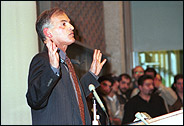Israel, Palestine and the Holocaust
Israel, Palestine and the Holocaust McGill University
User Tools (skip):
Israel, Palestine and the Holocaust
 Professor Norman Finkelstein addresses a McGill audience
Professor Norman Finkelstein addresses a McGill audiencePHOTO: Owen Egan |
|
To say that Norman Finkelstein is a controversial scholar is akin to saying that Bill Gates is a successful entrepreneur. Finkelstein is a professor at City University of New York who last year published a book entitled The Holocaust Industry: Reflections on the Exploitation of Jewish Suffering, which has unleashed a firestorm of criticism in the United States and Europe. "If the Jews were the primary victims of the Holocaust, then Palestinians have become the primary victims of 'The Holocaust,'" he said last week, in a lecture sponsored by Solidarity for Palestinian Human Rights.
Finkelstein's argument is that the historical event of the Nazi extermination of the Jews in the 1930s and '40s has become an ideology that allows the state of Israel to persecute and oppress Palestinians. It has also been used in what he terms a "shakedown" to extort money from Swiss banks and German industries.
According to Finkelstein, the Holocaust did not have its current place in the North American consciousness until the sixties and seventies. Finkelstein said that it was at this point that Israel became strategically important to the U.S. The "ideology" of the Holocaust became useful to both the U.S. and Israel to justify Israeli security tactics like establishing settlements, torturing prisoners, and denying Palestinian refugees the "right to return."
He said that certain historians' approach to the Holocaust -- that it is unique and not comparable to other genocides -- is not a valid approach.
"The standard of history is compare and contrast. If you start with the premise of 'do not compare' whatever else you may be doing, you are not doing history," he said.
The reason for interpreting the Holocaust as unique to Jews is it allows greater freedom in defending the Jewish people, according to Finkelstein.
"If you suffer uniquely, you get special moral dispensation," he said. "It's a doctrine of moral immunity and moral impunity... The Holocaust has become the chief ideological justification for the oppression of the Palestinian people."
Finkelstein is quick to point out that he himself is the son of Holocaust survivors; his father was interned in Auschwitz, his mother survived the Majdanek camp. He referred to them often throughout his lecture, using their experience as justification for his book.
He needs the defence. Finkelstein has been called "poison ... a disgusting, self-hating Jew, he's something you find under a rock" who "often presents his arguments as if he were a small and angry young child."
Finkelstein himself seems to revel in the abuse he has received since his book has come out. He points out that it has received almost entirely negative reviews. While the book sold badly in North America, it is a best-seller in Germany, where three books have been published refuting Finkelstein's thesis.
The negative reaction to The Holocaust Industry may be related to its author's tone. Finkelstein pulled no punches in his talk here and many of his comments provoked spontaneous applause from the over-flow audience.
"The Holocaust industry has created this ideological interpretation [of the Holocaust] which serves political ends but has very little to do with the event itself," said Finkelstein.
The "industry" to which he refers includes the museum directors, historians, compensation lawyers and activists who, he says, profit from the exploitation of the Holocaust, while the actual survivors of the event are ignored. He asserts that the number of survivors has been inflated in order to increase claims for compensation, and that these claims themselves contribute to growing anti-Semitism.
Yet Finkelstein's own writings are quoted approvingly on the web sites of hate groups and those who deny the Holocaust. He maintains, however, that he is only pointing out the wrongs of others, among whom he includes the "American Jewish elite."
Throughout his lecture he portrayed the "American Jewish elite" as greedy, and repeatedly referred to the recent legal battle to win compensation from Swiss banks as an extortion racket.
"There is a gang of Holocaust hoodlums, hucksters and gangsters that have exploited the Holocaust," he said. Countries such as Germany and Switzerland have borne the brunt of this, while countries such as the U.S., which he claims has a worse record for returning monies deposited with them during the Second World War, are left alone.
The compensation efforts and Israeli oppression justified in terms of the Holocaust denigrate the real event. Finkelstein's book and the various lectures he gives are to protect the memory of the victims of the Holocaust, and those that survived.
"The horror they endured deserves better than the exploitation of that horror," he said.

